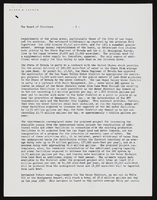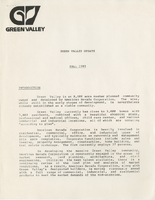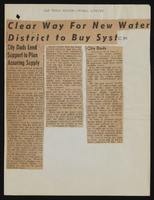Search the Special Collections and Archives Portal
Search Results
Urban Chamber of Commerce (Las Vegas, Nev.) (Las Vegas, Nev.)
The mission of the Urban Chamber of Commerce is to create and foster an environment that promotes development of members and black owned businesses. The Nevada Black Chamber of Commerce was founded July 7, 1980, after the idea was planted by Katherine Joseph. Ms. Joseph met with members of the Oakland, California Chamber of Commerce during a visit there and was very impressed with their efforts. When Katherine returned home she shared the idea with members of the NAACP. She solicited the help of Sarann Knight-Preddy who formed a board consisting of Dr.
Corporate Body
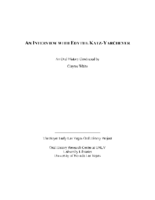
Transcript of interviews with Edythe Katz-Yarchever by Claytee White, 2000-2005
Date
Archival Collection
Description
Transcript of interviews with Edythe Katz-Yarchever by Claytee White over the course of several sessions in 2000, 2003 and 2005. In the interviews, Katz-Yarchever discusses her life in Las Vegas, owning theaters with her husband, Lloyd Katz, and the strides they made in civil rights. She talks about her service in Civil Defense and the National Guard, and moving to various places, then working in California and meeting her husband, Lloyd. The Katzes became involved in the community in various ways with Operation Independence and Holocaust education. About a decade after Lloyd's death, Edythe married Judge Gilbert Yarchever.
Edythe Katz-Yarvhever was born in Boston, a second generation American whose grandparents left Russia the century before. Edythe completed finishing school at the start of World War II and worked various jobs at home before joining the Civil Defense, and later, the National Guard. She moved to Maryland and got a job as a secretary at Edgewood Arsenal, then transferred to Cushing General Hospital to assist a Marine Corps neurologist, who was also a Jewish refugee. Towards the end of the war, she is transferred to an Army hospital in Hawaii, and thus began the rest of her life on the West Coast. When the war ended, Edythe sailed to California and worked various jobs in Los Angeles: in the secretarial pool at MGM Studios, for a casting agency and for a hotel magazine. Edythe met Lloyd Katz in San Francisco, and the two were married after a short courtship. The couple lived in San Francisco before moving to Las Vegas in 1951, where they took over the management of the Huntridge, Palace and Fremont theaters, then leased by Edythe's parents. The Katzes took a stand to desegregate their theaters, allowing black customers to sit with white patrons. Edythe and Lloyd became active in the city's Civil Rights Movement, including work with Operation Independence and the NAACP. Edythe started organizations like Volunteers for Education and Junior Art League, and directed an interfaith, interracial preschool. Lloyd would frequently open up their theaters to organizations to hold fundraisers, free-of-charge. Edythe was extremely active in the local Jewish community, including opening the city's first Jewish gift shop, serving as sisterhood president at her synagogue and starting the Jewish Reporter. She later founded a library for Holocaust education as well as assisted the school district's development of curriculum and teacher training relating to the Holocaust. Lloyd Katz passed away in 1986, and in 1995, Edythe married Gilbert Yarchever. Edythe and Lloyd's community service work was honored with the naming of their school, the Edythe and Lloyd Katz Elementary School, where Edythe still remains active.
Text

Photographs of McDonald's sign, 2800 S Las Vegas Blvd, Las Vegas (Nev.), 2002
Date
Archival Collection
Description
Site address: 2800 S Las Vegas Blvd
Sign details: Located just south of the Westward Ho's south parking lot is the third and northern most version of the sign. Unlike its other two relatives, this sign is solely designated to the McDonald's establishment. It is located in a small landscaped area directly east of the front of the restaurant. This section essentially comprises the front of the establishment itself. It stands tall on the west side of the strip facing north south.
Sign condition: Structure 5 Surface 4 Lighting 4 It is noted that the structural integrity is intact. Certain elements of lighting are out or not working but still present. The surface appears to be slightly deteriorating at this point.
Sign form: Pylon
Sign-specific description: The odd member of the three McDonald's pylons is different in almost every aspect, considering the similarity of the first two to each other. The sign construction itself is a more sleek, opting to integrate the entire structure into a much smoother design than the previous design as well. The other two cabinets are impressive indeed, but the placement of the cabinets is less clumsy than the others. The pole itself is thinner, painted brown steel flat post, which rises into the air, recording a small rectangular anomaly in the vertical line, which is used to support a yellow plastic internally lit cabinet. The four-sided shape swells out on each side, but transitions smoothly as the vertical shot continues upward. The brown post T's off to either side actually stretching to the widest point of the sign. It then grows vertically once again to create the sides of the cabinet. The shape that the brown portion creates is now more akin to a "U" shape rather than a "T." The entire surface of the pylon which is designated brown in laced with incandescent bulbs. Inside this U shape the face of the cabinet is designated red, and set higher above the surface plain of the face. The red fluted steel face is adorned with vertical neon bars and white channel letters floating above the surface. The channel letters are filled with bars of white neon. The giant golden arches break up the top edge of the red cabinet. The arches themselves are yellow painted steel, whose face are encrusted with yellow incandescent bulbs as well as border of yellow neon which floats around the edge of the arch. The tops and bottom surfaces are finished in a reflective, gold, polished metal. A channel runs up the center of the post and a yellow tube of neon glows as a centering stripe. This stripe actually ties in the internally lit yellow sign, with the crowning arches, quite well.
Sign - type of display: Neon; Incandescent; Backlit
Sign - media: Steel; Plastic
Sign - non-neon treatments: Paint
Sign animation: Oscillating, flashing
Notes: The white incandescent bulbs on the face of the sign illuminate in a chasing pattern from bottom to top, leaving all the bulbs illuminated in it's path, oscillating as they are illuminated. The post vertically illuminates, and when the bulbs reach the top of the brown arms of the U shape, the vertical, red, neon bars on the red portion of the cabinet, chase in simultaneously from either side. They meet in the middle leaving all the bars and thus the cabinet fully illuminated. The cabinet stays lit for a few moments, then the bars curtain out from the middle, back to either side, leaving the bars dark in the animations path. Once they reach the edge, the incandescent bulbs follow suit, and chase back down to the bottom, leaving all the bulbs dark it the chasing path. The yellow incandescent bulbs, which are on the face of the golden arches, constantly oscillate during the animations sequence.
Sign environment: As compared to the other two properties, the environment of this McDonald's is quite different. The other two were integrated into the strip mall design, utilizing the pylon itself for other advertisements as well. Even though the McDonald's pylon stood out as the dominant figure among their surroundings, They still felt as if they were part of a whole as well. The environment, which the northern pylon portrays, also reflects its surroundings as well. This environment of the Westward Ho, the Stardust, the Riviera, and the Circus Circus, bring about a certain garish nature in its design that fits in present in the McDonald's pylon.( see artistic significance and theme for further).
Sign manufacturer: YESCO
Sign - thematic influences: The theme of the McDonald's establishment is in the realm of the well-established McDonalds corporation. The golden arches, and solid red hue, have become synonymous with the name "McDonald's," and is an image, which has been communicated to the masses of people for half a century. It is an icon that is associated with America all over the world. McDonalds has created it's own realm and thematic influence over the years from all of it's extensive advertisements and marketing. Therefore, the theme of the establishment's signs draws from itself and the world, which the name has created. Being one of the most commonly seen images in America, this sign is tailored to fit into the illustrious, illuminative properties held on the Las Vegas Strip. It fits into the category of everyday images and businesses dressed up for Las Vegas, which include, Arabia's, Arco AM/PM, Walgreen's, and Fatburger.
Sign - artistic significance: Besides what is mentioned in the above paragraph about the above nature of the iconography of the said logo, this particular sign draws off of its surroundings to display certain aesthetic elements.
Surveyor: Joshua Cannaday
Survey - date completed: 2002
Sign keywords: Oscillating; Flashing; Pylon; Neon; Incandescent; Backlit; Steel; Plastic; Paint
Mixed Content
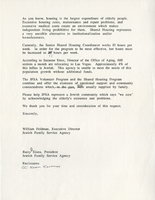
Letters from the Jewish Family Service Agency requesting financial aid from the Jewish Federation Foundation, February 1989
Date
Archival Collection
Description
Rough-draft versions of letters written by William Feldman, Executive Director of the Jewish Family Service Agency (JFSA), and Barry D. Eisen, President of the Jewish Family Service Agency, to Norman Kaufman, Executive Director of the Jewish Federation, and Paul Eisenberg, Chairman of the Endowment Committee, requesting financial aid from the Jewish Federation Foundation endowment fund to support the Jewish Family Service Agency's Elderly Services program. (Original order of pages is unclear, some pages may have been lost prior to donation.)
Text

Transcript of interview with Bruce Woodbury by Claytee White, February 25, 2009
Date
Archival Collection
Description
When Bruce Woodbury, native Las Vegan, attorney, and former county commissioner, looks back on growing up, he immediately says: My first memory of a house here in Las Vegas was in the John S. Park area. The Woodbuiy family lived in two houses in the neighborhood and attended only two schools, John S. Park Elementaiy and Las Vegas High School. Bruce's recollections begin in the 1940s, when they lived on the edge of town. Bruce has what he calls a "nostalgic yearning for the old Las Vegas, even though today it's an exciting, vibrant community in many ways." And during this oral history interview, he recalls the safe feeling of the times—unlocked doors and children allowed to roam more freely than today. The Strip was a "separate world" where kids like himself might go to a show occasionally with their parents, celebrate a prom dance or, as he did, get a part-time job. One of Bruce's jobs included being a busboy at the Flamingo Hotel & Casino where he confesses to learning and
Text


